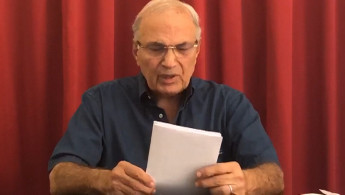UAE 'preventing Shafiq from leaving' to challenge Sisi in upcoming Egypt elections
The former Egyptian prime minister has told media he has been banned from leaving the Emirates after announcing his intention to run against Egypt's President Sisi.
2 min read
Ahmed Shafiq, the former Egyptian prime minister, has said he has been prevented from leaving the UAE after announcing his intention to stand in elections against incumbent president Abdel Fattah al-Sisi.
Shafiq, who lost the 2012 presidential election to Mohamed Morsi, has been living in the UAE since he failed to win the poll.
A court ruled last year that Shafiq should be allowed to return to Egypt. He had announced his intention to again stand as a presidential candidate earlier on Wednesday, but said he was "surprised" not to have been allowed to leave Abu Dhabi.
While the UAE and Saudi Arabia were firmly opposed to the Islamist Morsi, Egypt's first elected president, they have been strongly supportive of Sisi, who ousted Morsi in a military coup in 2013.
In a video recording sent to Al Jazeera's Arabic channel, which, like The New Arab, is banned in Egypt, he said he had been banned from leaving the UAE and that he did not understand the reasons behind the travel ban.
He also called on the UAE to refrain from interfering in Egypt's "internal processes".
Earlier on Wednesday, Shafiq, a former air force commander, said he planned to return to Egypt "in the coming days".
Egypt's election is expected to take place around April, when Sisi is widely expected to seek a second term in office.
"I'm honoured to announce my will to run in the upcoming presidential elections in Egypt as a choice to be president of the country for the next four years," he said in a statement to Reuters.
He highlighted his "long experience with the armed forces" and "noted success" as aviation minister.
Read more: Why don't Egypt's democrats play politics?
Shafiq was one of few figures to put his name forward as an opponent to Sisi, who has played a key role in an alliance with the UAE and Saudi Arabia in operations in Libya and in attempting to blockade Qatar.
Other notable potential presidential candidates have withdrawn under considerable pressure.
Khaled Ali, a human rights lawyer and potential opposition candidate, was arrested as part of a crackdown to detain leading opposition figures in a country known for enforced "disappearances", torture and extrajudicial imprisonment.
Shafiq, who lost the 2012 presidential election to Mohamed Morsi, has been living in the UAE since he failed to win the poll.
A court ruled last year that Shafiq should be allowed to return to Egypt. He had announced his intention to again stand as a presidential candidate earlier on Wednesday, but said he was "surprised" not to have been allowed to leave Abu Dhabi.
While the UAE and Saudi Arabia were firmly opposed to the Islamist Morsi, Egypt's first elected president, they have been strongly supportive of Sisi, who ousted Morsi in a military coup in 2013.
In a video recording sent to Al Jazeera's Arabic channel, which, like The New Arab, is banned in Egypt, he said he had been banned from leaving the UAE and that he did not understand the reasons behind the travel ban.
Twitter Post
|
He also called on the UAE to refrain from interfering in Egypt's "internal processes".
Earlier on Wednesday, Shafiq, a former air force commander, said he planned to return to Egypt "in the coming days".
Egypt's election is expected to take place around April, when Sisi is widely expected to seek a second term in office.
"I'm honoured to announce my will to run in the upcoming presidential elections in Egypt as a choice to be president of the country for the next four years," he said in a statement to Reuters.
He highlighted his "long experience with the armed forces" and "noted success" as aviation minister.
Read more: Why don't Egypt's democrats play politics?
Shafiq was one of few figures to put his name forward as an opponent to Sisi, who has played a key role in an alliance with the UAE and Saudi Arabia in operations in Libya and in attempting to blockade Qatar.
Other notable potential presidential candidates have withdrawn under considerable pressure.
Khaled Ali, a human rights lawyer and potential opposition candidate, was arrested as part of a crackdown to detain leading opposition figures in a country known for enforced "disappearances", torture and extrajudicial imprisonment.





 Follow the Middle East's top stories in English at The New Arab on Google News
Follow the Middle East's top stories in English at The New Arab on Google News
![Netanyahu furiously denounced the ICC [Getty]](/sites/default/files/styles/image_330x185/public/2024-11/GettyImages-2169352575.jpg?h=199d8c1f&itok=-vRiruf5)
![Both Hamas and the Palestinian Authority welcomed the ICC arrest warrants [Getty]](/sites/default/files/styles/image_330x185/public/2024-11/GettyImages-2178351173.jpg?h=199d8c1f&itok=TV858iVg)
